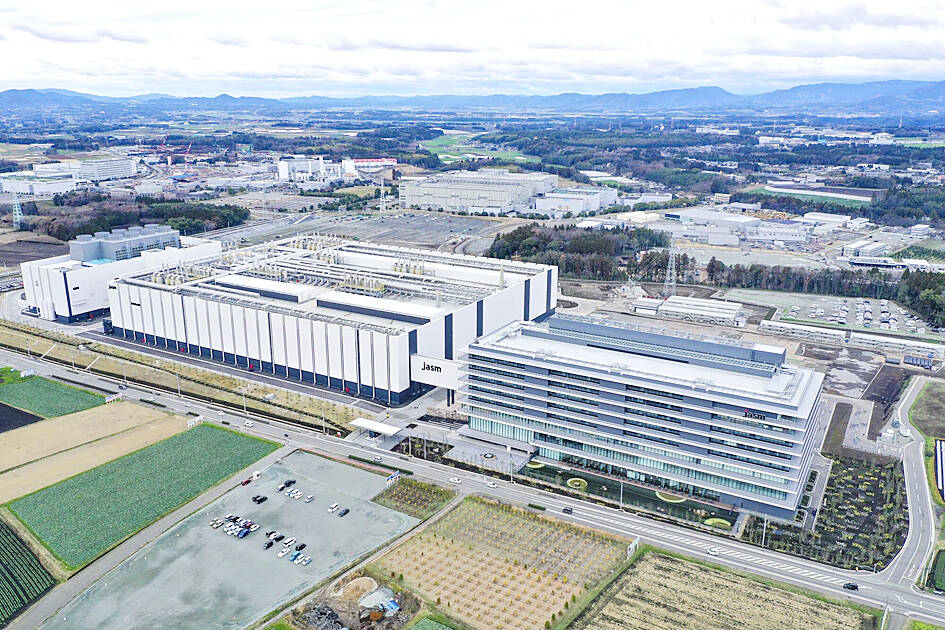The newly elected governor of Japan’s Kumamoto Prefecture said he is ready to ensure wide-ranging support to woo Taiwan Semiconductor Manufacturing Co (TSMC, 台積電) to build its third Japanese chip factory there.
Concerns of groundwater shortages when TSMC’s two plants begin operations in the prefecture’s Kikuyo have spurred discussions about the possibility of tapping unused dam water, Kumamoto Governor Takashi Kimura said in an interview on Saturday.
While Kimura said talks about a third plant have yet to occur, Bloomberg had reported TSMC is already considering its third Japanese fab — also in Kumamoto — which would make more advanced chips.

Photo: Bloomberg
“We are prepared to give our full support,” said Kimura, who took office last month.
The 49-year-old former central government bureaucrat said he has proposed a visit to the chipmaker’s Taiwan headquarters this summer to discuss another plant.
Semiconductor plants typically use thousands of cubic meters of groundwater per day. TSMC’s Japanese unit has pledged to reduce water consumption, recycle more water and make efforts to replenish more water than it uses.
TSMC opened its first factory in Japan in February, putting it on track to begin mass production later this year. Construction of TSMC’s second plant, which would also receive government subsidies, is scheduled to begin by the end of this year.
The two plants together are expected to employ more than 3,400 people, and have already propelled a surge in land prices and infrastructure investment. They are expected to contribute about ¥10.5 trillion (US$67.4 billion) to the economy of the broader prefecture over 10 years, according to the Kyushu Economic Research Center.
Talks during the construction of the first factory have equipped Kumamoto Prefecture with better road and water infrastructure and an education system that better supports international school students, Kimura said.
The governor said he hopes enough semiconductor-related companies and research institutions would settle in Kumamoto to create something akin to Hsinchu Science Park (新竹科學園區).
“We want to make Kumamoto a birthplace for a myriad of industries originating from semiconductors, such as AI [artificial intelligence], data centers and self-driving,” he said.
Semiconductors are essential for reducing energy consumption, Kimura said. “They’re necessary for the future of the planet.”

Jensen Huang (黃仁勳), founder and CEO of US-based artificial intelligence chip designer Nvidia Corp and Taiwan Semiconductor Manufacturing Co (TSMC, 台積電) on Friday celebrated the first Nvidia Blackwell wafer produced on US soil. Huang visited TSMC’s advanced wafer fab in the US state of Arizona and joined the Taiwanese chipmaker’s executives to witness the efforts to “build the infrastructure that powers the world’s AI factories, right here in America,” Nvidia said in a statement. At the event, Huang joined Y.L. Wang (王英郎), vice president of operations at TSMC, in signing their names on the Blackwell wafer to

France cannot afford to ignore the third credit-rating reduction in less than a year, French Minister of Finance Roland Lescure said. “Three agencies have downgraded us and we can’t ignore this cloud,” he told Franceinfo on Saturday, speaking just hours after S&P lowered his country’s credit rating to “A+” from “AA-” in an unscheduled move. “Fundamentally, it’s an additional cloud to a weather forecast that was already pretty gray. It’s a call for lucidity and responsibility,” he said, adding that this is “a call to be serious.” The credit assessor’s move means France has lost its double-A rating at two of the

AI BOOST: Although Taiwan’s reliance on Chinese rare earth elements is limited, it could face indirect impacts from supply issues and price volatility, an economist said DBS Bank Ltd (星展銀行) has sharply raised its forecast for Taiwan’s economic growth this year to 5.6 percent, citing stronger-than-expected exports and investment linked to artificial intelligence (AI), as it said that the current momentum could peak soon. The acceleration of the global AI race has fueled a surge in Taiwan’s AI-related capital spending and exports of information and communications technology (ICT) products, which have been key drivers of growth this year. “We have revised our GDP forecast for Taiwan upward to 5.6 percent from 4 percent, an upgrade that mainly reflects stronger-than-expected AI-related exports and investment in the third

RARE EARTHS: The call between the US Treasury Secretary and his Chinese counterpart came as Washington sought to rally G7 partners in response to China’s export controls China and the US on Saturday agreed to conduct another round of trade negotiations in the coming week, as the world’s two biggest economies seek to avoid another damaging tit-for-tat tariff battle. Beijing last week announced sweeping controls on the critical rare earths industry, prompting US President Donald Trump to threaten 100 percent tariffs on imports from China in retaliation. Trump had also threatened to cancel his expected meeting with Chinese President Xi Jinping (習近平) in South Korea later this month on the sidelines of the APEC summit. In the latest indication of efforts to resolve their dispute, Chinese state media reported that